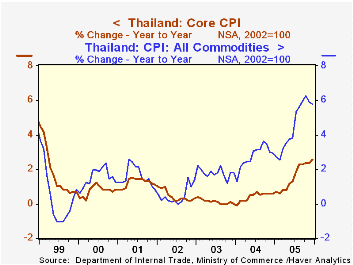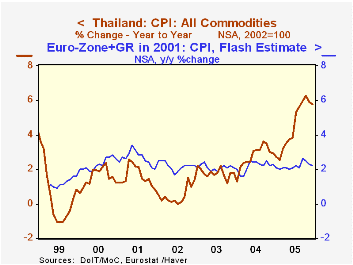 Global| Jan 04 2006
Global| Jan 04 2006Higher CPI in Thailand Is Rare Instance of Energy Cost Pass-Through
Summary
The overall CPI for Thailand was flat in December from November, when it had fallen 0.4% from October. But the total index for the year was up 5.8%, exactly double the increase in 2004. The December "core" rate, excluding raw food and [...]

The overall CPI for Thailand was flat in December from November, when it had fallen 0.4% from October. But the total index for the year was up 5.8%, exactly double the increase in 2004. The December "core" rate, excluding raw food and energy, was 2.6%, compared with a mere 0.6% in 2004 and zero in 2003. This is the highest core rate for Thailand since the aftermath of the currency crises in 1997-98. Thus, this marked advance in core inflation in 2005, indicates at least one nation where energy prices forced up some other costs enough to show through in core and total inflation outcomes. These data were reported today by the Thai Ministry of Commerce and are contained in Haver's EMERGEPR database.
As regular readers might be aware, we have monitored consumer prices throughout 2005 for signs of second-round effects of surging energy costs on other prices and have found precious little evidence of this. In the table below, we include data for Italy and the "flash" estimate for the Euro-Zone, which were both released today as well. They show that total inflation was steady or lower in 2005 compared with 2004, and through November, the Euro-Zone core CPI (excludes energy and unprocessed food) was 1.5%, lower than 2.1% across all of 2004.
In Thailand, though, there was apparently some pass-through of energy large enough to impact core inflation. Several categories experienced larger price increases last year, and the most notable was transportation and communication. This sector began to trend upward more rapidly in the spring of 2004 and continued to accelerate during 2005, reaching 13.3% in December, year-on-year. World Bank reports indicate that the government had been subsidizing diesel fuel and discontinued this subsidy; this added to the price increase from the cost of the fuel alone and led to substantially greater diesel costs in 2005, which apparently then generated a sizable rise in transportation costs generally in Thailand. This effect may not spread, especially since it was due to a change in Thai government price policy as well as the raw material cost, so we would conclude in this instance that the pick-up in Thai core inflation is "the exception that proves the rule" that general world-wide inflation has been remarkably impervious to the enormous rises in energy prices. Whether this will last through the winter heating season in the northern hemisphere remains to be seen, however.
| Thailand | Dec 2005 | Nov 2005 | Oct 2005 | December/December|||
|---|---|---|---|---|---|---|
| 2004 | 2003 | 2002 | ||||
| All Commodities (SA) | 0.0 | -0.4 | 0.4 | -- | -- | -- |
| Yr/Yr % (NSA) | 5.8 | 5.9 | 6.2 | 2.9 | 1.8 | 1.4 |
| Core CPI (SA) | 0.2 | 0.0 | 0.2 | -- | -- | -- |
| Yr/Yr % (NSA) | 2.6 | 2.4 | 2.4 | 0.6 | 0.0 | 0.3 |
| Transportation & Communication (SA) | 0.2 | -0.7 | 0.1 | -- | -- | -- |
| Yr/Yr % (NSA) | 13.3 | 11.3 | 13.1 | 4.1 | 3.1 | 4.7 |
| Memo: Italy CPI (NSA, Yr/Yr %) | 2.0 | 2.2 | 2.2 | 2.0 | 2.5 | 2.8 |
| Euro-Zone CPI "Flash" (NSA, Yr/Yr %) | 2.2 | 2.3 | 2.5 | 2.4 | 2.0 | 2.3 |
Carol Stone, CBE
AuthorMore in Author Profile »Carol Stone, CBE came to Haver Analytics in 2003 following more than 35 years as a financial market economist at major Wall Street financial institutions, most especially Merrill Lynch and Nomura Securities. She had broad experience in analysis and forecasting of flow-of-funds accounts, the federal budget and Federal Reserve operations. At Nomura Securities, among other duties, she developed various indicator forecasting tools and edited a daily global publication produced in London and New York for readers in Tokyo. At Haver Analytics, Carol was a member of the Research Department, aiding database managers with research and documentation efforts, as well as posting commentary on select economic reports. In addition, she conducted Ways-of-the-World, a blog on economic issues for an Episcopal-Church-affiliated website, The Geranium Farm. During her career, Carol served as an officer of the Money Marketeers and the Downtown Economists Club. She had a PhD from NYU's Stern School of Business. She lived in Brooklyn, New York, and had a weekend home on Long Island.
More Economy in Brief
 Global| Feb 05 2026
Global| Feb 05 2026Charts of the Week: Balanced Policy, Resilient Data and AI Narratives
by:Andrew Cates





